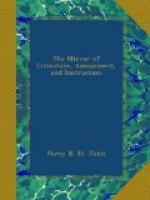“Your faithful and loving cousin, Casimir Zichy.”
“Read the letter again, father,” said Beatrice, with a tone such as he had never heard from her before; “read it again,” she cried, “pray read it again!—’my best and most zealous officer,’—is it not so?—’covered with wounds, and cannot live through the night,’—is it not so?—Father, I loved this Alvinzi.—Ah! yes, I loved him well—now better than ever;—but I knew it would be thus the very day on which I first saw him:—read it again,—pray do?”—and, with a still-bewilderment of eye, she took it from her trembling father, and read it slowly to herself. “Give me this letter, father;” and she put it in her bosom: and there it lay,—there it lay through a long and nervous illness, which mercifully terminated in her death.
For a long time she was enabled to govern and controul her feelings, and was silent, and, to outward seeming, resigned. She often remarked to her father, that she could, and did, say daily upon her knees, “Thy will be done,”—but that tears always followed that sincere, but mournful, exercise. However her frame at last gave way—she sunk into great weakness of body, and her mind became affected.
Her father watched her with unceasing solicitude throughout her sufferings; but he was often driven from her chamber by the agony of his emotions, as she read over the fatal letter, or sung, which she did continually, that mournful song of Thecla.
The world it is empty, the heart will
die,
There’s nothing to wish for beneath
the sky:
Thou Holy One, call Thy child away—
I’ve lived and loved; and that was
to-day—
Make ready my grave-clothes
to-morrow.
Such was the early and melancholy close of a young life of the loveliest promise. The severe and sudden horror struck hard upon her fine mind, and drove it mournfully astray. Her heart was so broken that she could not live on. But Julius Alvinzi did not then or so perish: for seventeen weeks he lay upon a hospital bed in Mantua, helpless as an infant; and finally recovered so much of health as gave him again the common promise of life. He was afterwards sent to pass the long period of his convalescence at Venice; but the Julius Alvinzi, who rode forth from Salzburgh, was no longer to be recognised: crippled in his limbs—his fine countenance disfigured by deep and unsightly scars—his complexion pale—his hair turned grey with suffering. He had already stepped on twenty years in as many weeks, and he was already, to the eye, a worn and broken-down officer of veterans. He could not stir a pace without crutches; and his hip had been so shattered and distorted that it was painful to see him move. It was well that Beatrice was in her grave. No doubt she would have exhibited the noble constancy of a pure, angelic, and true love;—but she was spared that longer and heavier trial.




